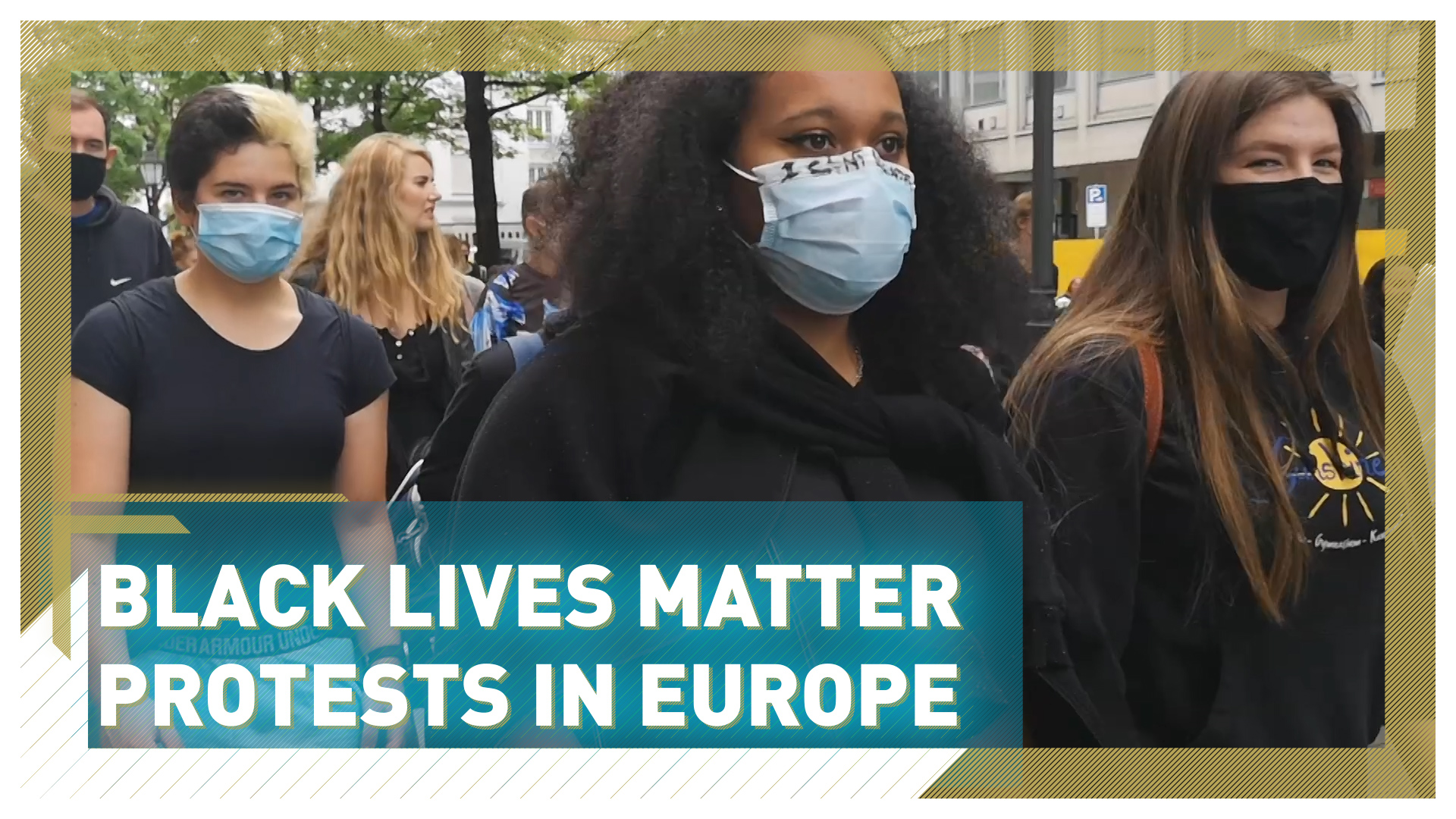02:15

All across Europe Black Lives Matters (BLM) protests have gathered huge crowds, after the killing of 46-year-old black American George Floyd by a white police officer in Minneapolis, Minnesota, on 25 May.
In London, protests started on Sunday 31 May and continued through the following week.
On Saturday 6 June thousands of people joined demonstrations in Parliament Square to condemn police brutality and racial discrimination.
The choice of location was significant, taking place outside the historic Houses of Parliament, where some protesters feel decisions have been made throughout the decades that have reinforced inequality.
It's also meters away from Downing Street - the official residence of the British Prime Minister Boris Johnson.
His colleague, Health Secretary Matt Hancock, urged people not to gather in the protests, as he said the threat of coronavirus was still very "real". Many protesters did wear face masks but there wasn't much social distancing taking place.
There were similar demonstrations in other UK cities and towns, including Manchester, Cambridge and Cardiff.

A protester makes a Black Lives Matter fist at a demonstration in Trafalgar Square in London. Credits: Tolga Akmen / AFP
A protester makes a Black Lives Matter fist at a demonstration in Trafalgar Square in London. Credits: Tolga Akmen / AFP
In the past few days, BLM protests have also taken place in Rome and Vienna, with some estimates counting as many as 50,000 people joining the demonstrations in the Austrian capital - one of the largest protests ever seen in the city.
Germans have also taken to the streets to show their support for Black Lives Matter in the capital Berlin. Some were wearing masks and raising a clenched fist, a symbol that has become associated with BLM and has a long history of representing black liberation and solidarity with oppressed people.
On Friday, thousands of protesters also took to the streets of the cities of Hamburg and Frankfurt, holding banners with slogans such as: "Your Pain Is My Pain, Your Fight Is My Fight".
Young Frankfurt protester Nuru Abubakari said: "I am subject to more and unjustified checks, even unjustified violence against us sometimes. And yes, today we are here to put out the message that it has to stop. Enough is enough."
Also in Frankfurt Mahalac Weleyes called the killing of George Floyd 'indescribable'. "I don't understand why a man had to die in order to understand how systemic racism leads to the death of minorities. We are here to make everybody understand that we stand in solidarity."

A demonstration at the Römerberg square in Frankfurt, Germany. Credits: Boris Roessler/dpa via AP
A demonstration at the Römerberg square in Frankfurt, Germany. Credits: Boris Roessler/dpa via AP
Protesters also gathered in the Czech capital Prague and marched through the old town of the western Austrian city of Salzburg on Saturday.
In an interview with a local newspaper, co-organizer Erica Emofonmwan said: "We commemorate George Floyd and are committed to ensuring that all people get fair chances in life and are treated equally - regardless of their skin color or origin."
Outside the US embassy in Warsaw, Poland, thousands of people gathered on Friday, while in the southern city of Krakow an altar for George Floyd has been set up outside the U.S. Consulate with his picture along with flowers and signs baring the Black Lives Matter slogan.

Demonstrators in Vienna, Austria. Credits: AP Photo/Ronald Zak
Demonstrators in Vienna, Austria. Credits: AP Photo/Ronald Zak
However, not all protests were peaceful. In Greece police fired tear gas on protesters in the capital Athens to disperse the people who had gathered outside parliament.
A solidarity march in Stockholm, Sweden, was broken down by the police on Friday for breaking social distancing and not respecting the limit of fifty people allowed in gatherings.
In France, demonstrations scheduled for Saturday in Paris were banned due to police concerns about social disorder and violations of social distancing. Protests earlier in the week were met with unrest.

Protesters in Paris, France. Credits: Stefan de Vries/CGTN
Protesters in Paris, France. Credits: Stefan de Vries/CGTN
Not only an American problem: Racism in Europe
The European Union's own Fundamental Rights Agency says based on their own studies that "racist harassment, violence and discriminatory ethnic profiling are commonplace in Europe."
There have been cases across the continent where people of color died while in police custody.
The German Chancellor Angela Merkel has called Floyd's death "murder" adding that "racism is something terrible."
Last week, Berlin became the first German state to pass its own anti-discrimination law barring public authorities - which includes the police - from discriminating based on background, skin color, gender, religion, physical or mental disability, worldview, age and sexual identity.
But the silence of other leaders, or their late reaction – Dutch Prime Minister Mark Rutte or British Prime Minister Boris Johnson, among others - has been noticed by protesters.
Reporting by Natalie Carney, Nawied Jabarkhyl and Giulia Carbonaro